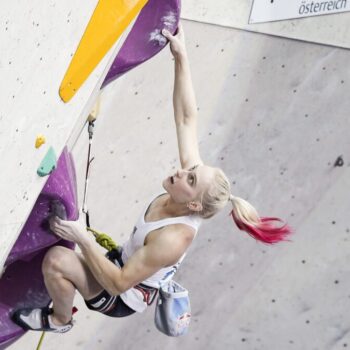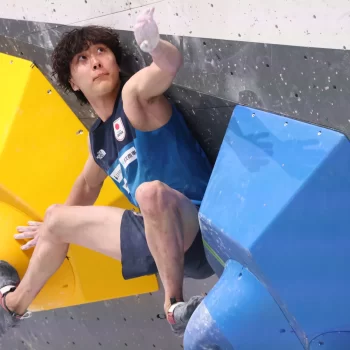Climbers Miss World Cup Events: The Selective Pursuit to the Top
Table of Contents
Why do climbers miss World Cup events?
Sport climbing has grown exponentially in popularity over the years, garnering a dedicated community of climbers who push the limits to reach the top of the podium. One of the pinnacle events for sport climbers is the IFSC-Climbing World Cup where athletes can compete in their respective disciplines: lead, boulder, or speed climbing.
Yet, in one competition, you may watch your favorite climber go head-to-head to get to the top of the leaderboard and earn a place on the podium; in the next event, you will be disappointed to see he or she won’t be there. Due to various reasons, some climbers choose to strategically miss specific competitions, opting to be more selective about which competitions they attend.
In this article, we delve into the possible reasons why competitive sport climbers miss World Cup events and the benefits they derive from making such a decision.
Specialization and Event-Specific Skills
Sport climbing competitions encompass the disciplines of lead, boulder, and speed climbing. Each discipline requires a unique skill set and athletes typically excel in one or two areas more than others. By selectively choosing which competitions to participate in, climbers can prioritize events that align with their strengths, giving them a higher chance of success.
For example, a climber who excels in bouldering might choose to skip lead climbing events to focus on perfecting their specialty. This allows them to allocate more time and energy to train for competitions where they have a greater chance of achieving top rankings and maintaining their position in the overall rankings.
Climbers Miss World Cup Events: Qualifying for the Olympics
The inclusion of sport climbing as an Olympic sport has created new opportunities and challenges for climbers. Given the limited number of available Olympic spots (40), sport climbers meticulously plan their competition schedules to focus on events that offer them the highest point potential for qualification. For more information about the Olympics qualification system for pro-climbers, check it out here.
Managing Fatigue and Preventing Injury
Competitive climbers push their bodies to the limits, subjecting themselves to intense training and frequent competitions. Overexertion and fatigue can increase the risk of injuries making it important to schedule adequate rest and recovery periods. Especially when a climber gets injured at an event, it can be a likely situation that the athlete chooses to skip the next competition(s) to allow for enough recovery time.
Climbers miss World Cup events due to injuries not only during the event season but also from practice. For example, Janja Garnbret opted out of the 2023 Asia and North American circuit to recover from a toe injury she sustained during training.
“My come back to the competition circuit will have to wait a bit, as I’ve decided to skip the bouldering comps in both Asia and the US to give my toe some more time to recover.”
Janja Garnbret, April 14, 2023
Additionally, the demanding nature of climbing requires athletes to maintain a delicate balance between physical and mental well-being. Climbers miss World Cup events so they can avoid mental fatigue. Especially dealing with jet lag, adjusting to new environments, back-to-back competitions, difficult performances, etc. can all pile up and end up influencing a climber’s mental well-being.
Injuries and mental/physical fatigue can really affect an athlete’s performance. It is important that they are on top of their game in order for them to showcase their full potential when it matters most.
Travel and Cost Considerations
The IFSC-Climbing World Cup series spans multiple countries and continents. Each competition entails significant travel and associated expenses. This can lead to travel fatigue, which can influence their overall performance.
Furthermore, it can be financially burdensome to attend all events. There are definitely certain professional climbers who receive sponsorship(s), but for others that are self-funded or rely on limited sponsorship, the financial burden of participating in every event can be overwhelming. It’s a possibility that some climbers miss World Cup events to help manage their budgets effectively.
Periodization and Training Cycles
Climbers follow intricate training cycles, known as periodization, to optimize their physical and mental performances. These cycles consist of different phases, including preparation, specialization, and peaking, each designed to enhance specific aspects of climbing ability.
By selecting which competitions to attend and which to skip, climbers can align their competition schedule with their training cycles. Climbers miss World Cup events because it allows them to maximize their performance during peak periods while dedicating appropriate time for focused training during off-peak periods.
Next World Cup Events

It is definitely disappointing, to say the least, that the entire roster of professional climbers won’t be competing altogether at every event. Yet, it is very understandable the possible reasons why climbers miss World Cup events. Want to know if your favorite climber will be in the next event? Always check their social media for announcements or check the rosters for the next event.
Interested in checking out which World Cup event is coming up next, check out our full event calendar.





